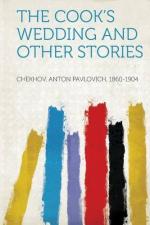“Yes, it’s not right,” he continued. “I did not expect it of you. In the first place, you ought not to take tobacco that does not belong to you. Every person has only the right to make use of his own property; if he takes anyone else’s . . . he is a bad man!” ("I am not saying the right thing!” thought Yevgeny Petrovitch.) “For instance, Natalya Semyonovna has a box with her clothes in it. That’s her box, and we—that is, you and I—dare not touch it, as it is not ours. That’s right, isn’t it? You’ve got toy horses and pictures. . . . I don’t take them, do I? Perhaps I might like to take them, but . . . they are not mine, but yours!”
“Take them if you like!” said Seryozha, raising his eyebrows. “Please don’t hesitate, papa, take them! That yellow dog on your table is mine, but I don’t mind. . . . Let it stay.”
“You don’t understand me,” said Bykovsky. “You have given me the dog, it is mine now and I can do what I like with it; but I didn’t give you the tobacco! The tobacco is mine.” ("I am not explaining properly!” thought the prosecutor. “It’s wrong! Quite wrong!”) “If I want to smoke someone else’s tobacco, I must first of all ask his permission. . . .”
Languidly linking one phrase on to another and imitating the language of the nursery, Bykovsky tried to explain to his son the meaning of property. Seryozha gazed at his chest and listened attentively (he liked talking to his father in the evening), then he leaned his elbow on the edge of the table and began screwing up his short-sighted eyes at the papers and the inkstand. His eyes strayed over the table and rested on the gum-bottle.
“Papa, what is gum made of?” he asked suddenly, putting the bottle to his eyes.
Bykovsky took the bottle out of his hands and set it in its place and went on:
“Secondly, you smoke. . . . That’s very bad. Though I smoke it does not follow that you may. I smoke and know that it is stupid, I blame myself and don’t like myself for it.” ("A clever teacher, I am!” he thought.) “Tobacco is very bad for the health, and anyone who smokes dies earlier than he should. It’s particularly bad for boys like you to smoke. Your chest is weak, you haven’t reached your full strength yet, and smoking leads to consumption and other illness in weak people. Uncle Ignat died of consumption, you know. If he hadn’t smoked, perhaps he would have lived till now.”
Seryozha looked pensively at the lamp, touched the lamp-shade with his finger, and heaved a sigh.
“Uncle Ignat played the violin splendidly!” he said. “His violin is at the Grigoryevs’ now.”
Seryozha leaned his elbows on the edge of the table again, and sank into thought. His white face wore a fixed expression, as though he were listening or following a train of thought of his own; distress and something like fear came into his big staring eyes. He was most likely thinking now of death, which had so lately carried off his mother and Uncle Ignat. Death carries mothers and uncles off to the other world, while their children and violins remain upon the earth. The dead live somewhere in the sky beside the stars, and look down from there upon the earth. Can they endure the parting?




